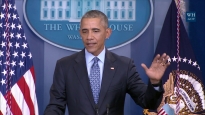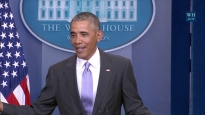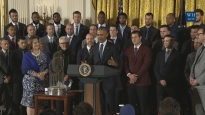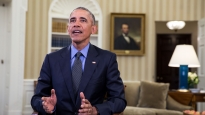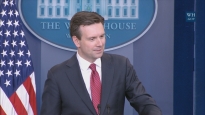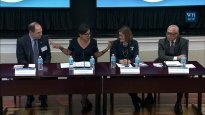President Obama Speaks at a Business Council Dinner
February 27, 2013 | 9:26 | Public Domain
President Obama delivers remarks to the Business Council during a dinner.
Remarks by the President at Business Council Dinner
Park Hyatt Hotel
Washington, D.C.
7:39 P.M. EST
THE PRESIDENT: Thank you. Please -- I didn’t think they were going to do the music. (Laughter.)
Andrew, thank you very much for your introduction and your leadership. I want to say hello to everybody. Many of you I've known for a very long time, and some of you I've met more recently. But let me say at the top what I always like to emphasize when I get a chance to speak to our business leaders, and that is I am very much rooting for your success, because what is absolutely true is that when your companies are thriving, when your bottom line is where it needs to be, then the possibilities of jobs and growth and people being able to achieve their dreams are greatly enhanced.
Now, the good news is, is that after four years of difficult times, we have seen a steady recovery, if not as robust as we would like. And we've seen over 6 million jobs created over the last 35 months. Housing is finally beginning to recover. There is reason for optimism as we move forward.
I think what everybody here is aware of, though, is that we've got a long way to go. Unemployment is still too high. Middle-class families are still feeling enormous stresses and strains. And what I think everybody is concerned about is the enormous uncertainty in terms of the political framework, the tax framework, the debt framework within which all of you are going to be operating over the next several years.
And right now, the biggest manifestation of that is the potential for a sequester that kicks in, starting at the end of this week. Now, I should point out and I'm sure you've heard from a number of experts and economists that this is not a cliff, but it is a tumble downward. It's conceivable that in the first week, the first two weeks, the first three weeks, the first month -- that unless your business is directly related to the Defense Department, unless you live in a town that is directly impacted by a military installation, unless you're a family that now is trying to figure out where to keep your kids during the day because you just lost a Head Start slot -- a lot of people may not notice the full impact of the sequester.
But this is going to be a big hit on the economy. And both private sector as well as public sector economists are estimating that we could lose as much as six-tenths of a point, maybe a little bit more, of economic growth. And that means, inevitably, hundreds of thousands of people who are not going to get jobs that otherwise would get them. It means that you have fewer customers with money in their pockets ready to buy your goods and services. It means that the global economy will be weaker, because although we obviously still have a long way to go in recovery, we're actually doing significantly better than some of the other developed nations. And the worst part of it is it's entirely unnecessary. It's not what we should be doing.
I've said this before, I will say it again, and I suspect I will be repeating it during the question and answer session -- but if you look right now at what our economy needs, taking $85 billion out of it over the next six months -- indiscriminately, arbitrarily, without a strategy behind it -- that's not a smart thing to do if we're serious about making sure that America grows and that our middle class is thriving and there are ladders of opportunity into the middle class.
What we should be doing -- and what I've been calling for repeatedly over the last not just several months, but several years -- is a balanced approach to deficit reduction that combines some tough spending cuts, particularly focused on how do we deal with long-term trends on some of our entitlement programs, and a tax reform agenda that without raising tax rates further could in fact raise sufficient revenues that combined would yield about $1.5 trillion in deficit reduction over the next decade; would replace the sequester; would bring our deficit-to-GDP ratios below the 3 percent threshold that we need for stabilization; that would stabilize our debt-to-GDP ratios for the next decade; and would lay the groundwork for more expansive growth because we would have simplified our tax system, closed some loopholes, broadened our base, seen an opportunity for corporate tax reform that could also make the whole system more sensible and give you guys a more competitive posture internationally. That's what we should be doing.
Now, you'll be happy to know that that's what I offered to my Republican friends back in December after my election, before the fiscal cliff. Many of you were involved in voicing support for such a balanced approach, even if you didn't sign on to every detail and every line item in our recommended budget. And what I've said is that that continues to be the offer on the table. I am prepared to make some tough decisions, some of which will garner some significant frustration on the part of members of my party, but I think it’s the right thing to do.
What I can’t do is to abide by a set of decisions here in Washington that would put the entire burden of deficit reduction on our seniors -- making their health care more expensive; students -- that would make their student loans and going to college more expensive; that would gut our investments in education and research and infrastructure -- all the foundations for long-term growth. That’s not what we’re going to do, because it wouldn’t be good for the country and, frankly, it would not be good for your businesses.
Now, the question then becomes how do we get from here to there. And I was telling Andrew before we came out the issue is not technical, the issue is political. And the question is whether or not we are going to see a willingness on the part of all parties to compromise in a meaningful way. And what that means is Democrats have to accept the need for entitlement reform. But it also means that Republicans have to accept the need for additional revenues if we’re going to be able to actually close this deficit and provide the kind of certainty that you need to make your long-term investments.
Whether that can be done in the next two days -- I haven’t seen things done in two days here in Washington in quite some time. On the other hand, the good news is that I think the public is beginning to pay attention to this, and one thing I’m certain about is that the country as a whole is weary of Washington for presiding over a manufactured crisis every three months. It’s not good for business confidence. It’s certainly not good for consumer confidence. It’s unnecessary.
And my strong hope, and the case that I’m taking to the American people, is that we can once and for all resolve this in a way that is equitable, in a way that is focused on growth, in a way that provides opportunity for everybody in this country who’s willing to work hard -- regardless of what they look like or where they come from or what region of the country they live in. And it’s right there. It’s there for the taking.
And what I strongly believe is that if the business community speaks out for such a sensible, balanced, responsible approach, then eventually it will get done. I think it was Winston Churchill who once said that Americans always do the right thing after they’ve exhausted every other possibility. And we’re getting to the point where we’ve now exhausted every other possibility. And I have confidence that what’s been true for our country in the past will be true for this country in the future.
So with that, let me just open it up and take some questions. I think we’re going to move the press out of the way. Thank you. (Applause.)
END
7:48 P.M. EST
|
January 18, 2017
|
January 17, 2017
|
January 16, 2017
|
January 16, 2017
|
|
January 14, 2017
|
January 13, 2017
|
January 13, 2017
|
January 12, 2017
|
